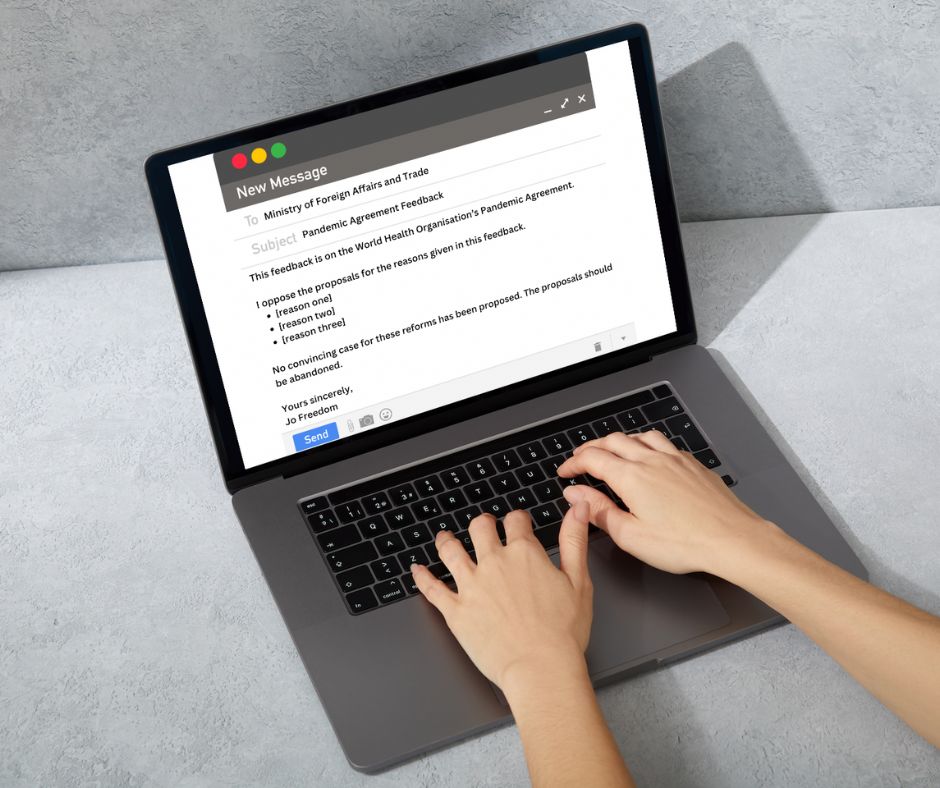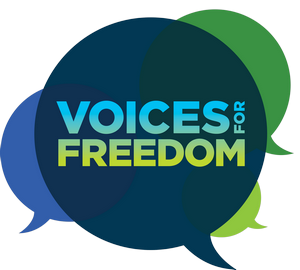Get Started!
INSTRUCTIONS – HOW TO USE THIS TEMPLATE:
- Copy and paste the template into a Word document or email.
- Choose 3+ points from the bullet points below and add them to your document or email. It’s important to use your own selection so that your feedback is unique to you.
- Add any other points you wish.
- Send to:
Email: [email protected]
Mail: Pandemic Instrument Coordinator, Legal Division, Ministry of Foreign Affairs and Trade, Private Bag 18-901, Wellington
Here is the Pandemic Treaty that feedback is being sought on. Remember, they’re dated 30 October 2023.
Each of the bullets cross reference to the relevant Article in the Pandemic Treaty.
But note, further sections have been updated, and are dated 8 February 2024: Chapter I, Chapter II (Art 4, 5, 6), Chapter II (Art 7, 8, 16-18), Chapter II (Art 9), Chapter II (Art 10, 11 and 13), Chapter II (Art 19, 20), Chapter III. These have only just been made public, so we are still reviewing.

Your Email Template:
To: Ministry of Foreign Affairs and Trade
This feedback is on the World Health Organisation’s Pandemic Treaty.
I oppose the proposals for the reasons given in this feedback.
-
[reason one]
-
[reason two]
-
[reason three]
No convincing case for these reforms has been proposed. The proposals should be abandoned.
Yours sincerely,
[your name]
[your email]
Bullet Points To Choose From:
Censorship and control of the narrative
- One of the most concerning concepts throughout the Pandemic Treaty is the censorship of information and the entire control of the narrative. From controlling research and development (Article 9) to defining infodemic as too much information (Article 1) and encouraging countries to target misinformation and disinformation (Article 18).
A new superpower will be created with the WHO’s Pandemic Treaty
- It establishes international supply networks, which will be overseen by the WHO. (Article 13).
- Outlines the funding structures and processes, including specifying that Member States pay ≥5% of their national health budgets, which will be ‘devoted to health emergencies’ – based on New Zealand’s 2022/2023 health care budget, that will be at least $1.5 billion dollars every 2 years New Zealand will have to pay to the WHO. How can we justify this type of expenditure when we have a cost of living crisis and a broken medical system? This $1.5 billion, is in addition to the $NZ2.9M, NZ has been assessed to pay for 2024/2025. To put that in to context, that $1.5 billion over 2 years would pay for 21,000 senior nurses; replace 60,000 knees or hips; or remove 333,000 cataracts. That is paying for a real need, rather than a ‘potential pandemic’. I know where I would prefer to see that extra money spent and it is not towards the WHO’s Pandemic Preparedness! (Article 20)
- A new ‘Governing Body’ will be created under the auspices of the WHO, to oversee the whole process. With the establishment of both a Compliance Committee and a Conference of Parties. A system that has seen huge criticisms as it has tried to operate in the ‘Global Climate’ space. (Article 21).
Removes any product liability away from vaccine manufacturers
- At no time is it appropriate nor suitable for pharmaceutical manufacturers to be excluded from liability, especially by requiring New Zealanders to indemnify the pharmaceutical manufacturers. (Article 15.3).
- The establishment of no-fault vaccine injury compensation schemes for those injured by pharmaceuticals, means those injured by the products will be paid for and supported by the taxpayer, when responsibility should sit with the company that made the products. (Article 15.2).
Oppose equity, inclusivity and the One Health agenda
- One Health is to be promoted and implemented by countries. One Health is a focus on ‘integrating and balancing the health of people, animals and the environment. (Article 1 and 5).
- One Health, in exchange for individual human rights and freedoms to choose, has no place in any treaty or agreement about health. (Article 1 and 5).
Uphold individual human rights and fundamental freedoms of person
- It will deny the principle of informed consent, the right to access safe and effective medical products, and the right not to be subjected without free consent to medical or scientific experimentation (Articles 1(d), 5, 15 in contradiction of Article 7 of the ICCPR).
- It will entrench the WHO’s infodemic management activities (Articles 1 and 18) which interfere with, among other things, the right to freedom of expression and to receive and impart information (Article 19, ICCPR; Article 10, ECHR) and the rights to health and science (Article 15(1)(b) ICESCR).
- It will deny the right to privacy and data protection concerns (Article 17 ICCPR; Article 8 ECHR), which are given only scant consideration in the proposals, even though those proposals contemplate the digital sharing and surveillance of health data, including genomic data (Articles 5, 6 and 12).
Public health surveillance
- Outlines public health surveillance, including testing and collecting all sorts of pathogens of pandemic potential and storing them in a central location. (Article 4).
Other information you might like to include
- The June 2023 version of the Pandemic Treaty described the need for the new Pandemic Agreement to be “In recognition of the catastrophic failure of the international community in showing solidarity and equity in response to the coronavirus disease (COVID-19) pandemic”. These are incredibly powerful and emotive words used to justify the implementation of this convention instrument, especially as there has been no pause for reflection, inquiry or report into the successes and failings of the last 4 years. What does the WHO base such statements on? And why has this statement been removed from the current version of the Pandemic Treaty that MFAT is seeking feedback on?
- The public health response of the last 4 years was able to be conducted under the 2005 International Health Regulations, which are currently binding on New Zealand. Those 2005 IHRs allowed the WHO to make recommendations only. New Zealand voluntarily cooperated with the recommendations of the WHO. New Zealand does not need a version of the regulations which removes from it the power to make decisions in the best interests of its people.
- No time has been taken or inquiry completed to assess New Zealand’s response to the international public health emergency. Therefore, there has been no time to review or make findings of what we got right and what we could improve upon. An outcome from an inquiry is required before we run headlong into a set of regulations that will only strengthen the WHO’s power to make decisions with respect to health emergencies of international concern.The Pandemic Instrument you have provided us to comment upon is dated 30 October 2023. Since then, there has been one meeting, and two more meetings are scheduled for February and March 2024 before New Zealand will be asked to vote on it in May 2024. I question the utility of asking for feedback on out-of-date documents?
- New Zealand’s former Prime Minister Chris Hipkins’ words are an important reminder: “Unlike New Zealand lawmaking, where elected representatives vote on laws, the WHO lawmaking process involves mostly unelected diplomats voting on the treaty.” These very treaties are the ones the New Zealand government is considering whether to adopt.
- Cabinet’s papers on the 2 treaties identifies objectives which Cabinet describes as key. Concerningly, these objectives include: Coherence, Equity, One Health, Timely access to pathogens, Governance and Trade. The Cabinet papers appear to replicate concepts from both the IHR Amendments and Pandemic Treaty, suggesting that the Cabinet paper has been drafted to ensure that the Pandemic Treaties are adopted and implemented without any real consideration for the people of New Zealand.
